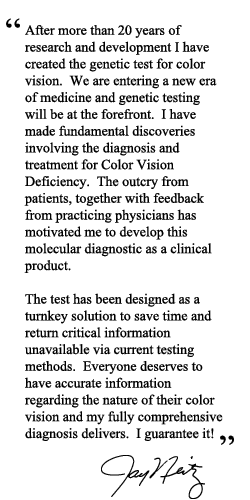 After almost 100 years since Dr Shinobu Ishihara published his first color blindness test based on pseudoisochromatic plates, we are definitely looking into a new area of color vision testing. Based on the very promising tests of Jay Neitz and his team, where colorblind monkeys started to disinguish certain colors, the company Genevolve is planning to put a genetic color blindness test on the market by the end of 2011.
After almost 100 years since Dr Shinobu Ishihara published his first color blindness test based on pseudoisochromatic plates, we are definitely looking into a new area of color vision testing. Based on the very promising tests of Jay Neitz and his team, where colorblind monkeys started to disinguish certain colors, the company Genevolve is planning to put a genetic color blindness test on the market by the end of 2011.
The Eyedox genetic test for color blindness doesn’t need any pictures or complicated apparatus, but just a few cells from the inner cheek from where your DNA can be extracted from. This makes the test also available for young toddlers and the results can’t be influenced by misunderstanding, light conditions or any other external factors.

Many colorblind people all around the world are looking forward to get such a scientific, precise and fool-prove possibility to test their color blindness. As there are many different tests around these days, and even some online possibilities to test your color vision, you are never really 100% sure if the results tell you the truth. With a genetic test at hand a new reliable option is available. On option which can make you feel more sure to know your real grade of color vision.
Eyedox Color Blindness Diagnosis
If you take an Eyedox color vision deficiency test, not only your cvd type will be diagnosed but also the severity of it. In detail this means:
- CVD Type: The test is diagnosing anomalous trichromacy including the different subtypes deuteranomaly (green-weak) and protanomaly (red-weak) and also dichromacy with the subtypes deuteranopia (green-blind) and protanopia (red-blind). This means any type of red-green color blindness is diagnosed in detail.
- Severity: The severity of your color vision deficiency is shown on a scale from 1 to 100 and it is also assigned to one of the degrees very mild, mild, medium, strong or very strong.
Personally I think the strength of the Eyedox test will be the differentiation between a dichromacy and an anomalous trichromacy and a detailed severity analysis of your color blindness. On the other side we have the weakness of the test, that tritanomaly and tritanopia (blue-yellow color blindness) can not be tested with it.
Genetic Treatment of Color Blindness
Many people are not only looking for an accurate cvd test but also a possibility to treat their deficiency and get rid of it. Especially all the colorblind pilot, police officer, and firefighter aspirants, who are rejected because of their visual handicap. Genevolve did not only invest into a genetic color vision test, but is also looking into the development of a therapy to treat color blindness. Hereafter you can find a possible timeline for this next huge step forward in scientific research of color vision:
- In the year 2009 some squirrel monkeys were cured of their color blindness by genetic therapy.
- In the same year Genevolve was founded, a “life sciences company which researches, designs and commercializes non-invasive molecular diagnostic assays and treatments for clinical applications for the color vision industry”.
- In 2010 a Survey on Gene Therapy for Red-Green Color Blindness was done.
- In 2011 Genevolve announces Eyedox, a genetic color blindness test which is based on a non-invasive molecular diagnostics.
- Also in 2011 the US Federal Drug Administration (FDA) requires further animal tests which will require maybe another one to two years of testing.
- If everything runs smoothly, after that for the first time a handful of selected red-green colorblind people will get a genetic treatment (those are already preselected and nobody can apply for this first test group!)
- If they achieve success with the first group, more test subjects will be needed to broaden the treatment and get more detailed test results. If you like to, you can enroll for this second phase. But be aware, this can take another one to three years until those test will get started.
Some Thoughts
I really think it is great work what they are all doing. We will all learn a lot more about our color vision and maybe in the future, some people can even cure their color vision deficiency. But I also think we should ask ourselves, if we really need a genetic treatment just to see some more colors in our life or to get a possibility for the job of our dreams. Do we have to alter our genes for that? What else happens to a human body if we do it? How far shall and can we go when it comes to the innermost of every thing alive?
Anyway. Genevolve, we are all eager to learn more about your next steps and your success stories of treating color blindness and we are looking forward to learn more about your genetic color blindness test as soon as it is available.
